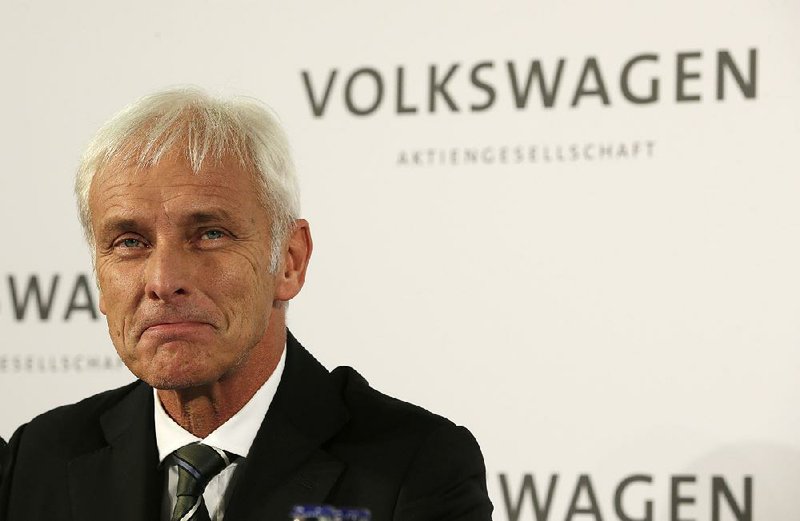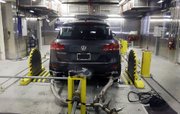WASHINGTON -- The U.S. government said Monday that Volkswagen cheated a second time on emissions tests, programming about 10,000 cars with larger diesel engines to emit fewer pollutants during testing than in real-world driving.
The German automaker installed software designed to defeat the tests on VW, Porsche and Audi vehicles from the 2014 to 2016 model years with six-cylinder diesel engines, according to the Environmental Protection Agency and California Air Resources Board. While on the road, the cars give off up to nine times more nitrogen oxide pollution than allowed by EPA standards, the agency said.
The findings put significant new pressure on Volkswagen, which did not reveal the defeat devices, and its new chief executive, Matthias Mueller, who was previously the head of Volkswagen's Porsche division.
Mueller's predecessor, Martin Winterkorn, resigned in September after regulators in the United States disclosed that the German automaker had installed sophisticated software on some Volkswagen diesel models that reduced pollutant emissions when the cars were being tested. In day-to-day usage, the mandatory controls were turned off, providing the cars with better engine performance but emitting as much as 40 times the legal limits of nitrogen oxide, a pollutant linked to lung ailments.
Volkswagen has suspended several high-ranking officials potentially associated with the deceit.
"VW has once again failed its obligation to comply with the law to protect clean air for all America," said Cynthia Giles, assistant administrator for the EPA's Office for Enforcement and Compliance Assurance.
Giles said the EPA had "clear evidence" of the violations and that an investigation was ongoing.
The cheating was discovered by EPA and California Air Resources Board tests performed after VW acknowledged in September that it rigged emissions tests for four-cylinder diesel engines on 11 million cars worldwide, including almost 500,000 in the U.S.
The automaker "knew or should have known that the software ... bypasses, defeats or renders inoperative elements of the vehicle design related to compliance with Clean Air Act Emission standards," the agency said in a violation notice sent to VW on Monday.
VW officials, including U.S. Chief Executive Officer Michael Horn in congressional testimony, have claimed only a small number of software developers in Germany were responsible for the computer code. On Monday, analysts said the latest charges call those claims into question.
"Volkswagen would do well to immediately and completely disclose all people and products involved in this deception, no matter how far-reaching," said Karl Brauer, a senior analyst for Kelley Blue Book, a widely used car valuation and research service.
Monday's announcement makes the notion that only a limited number of people were involved in the deception appear "even more outrageous," Brauer said.
Members of Congress reacted sharply. The House Energy and Commerce Committee said an investigation of VW will continue.
"The latest revelations raise the question, where does VW's road of deceit end?" said a joint statement by full committee Chairman Fred Upton of Michigan and senior Democrat Frank Pallone of New Jersey, along with oversight and investigations subcommittee Chairman Tim Murphy of Pennsylvania and senior Democrat Diana DeGette of Colorado.
"It's time for Volkswagen to fully come clean," the statement said.
Volkswagen faces fines of up to $37,500 per vehicle, which means up to $375 million could be added to penalties already projected in the billions of dollars. The company has set aside about $7.38 billion to pay for eventually recalling and fixing the affected cars. Analysts expect the impact will likely be several times larger than the amount VW has set aside.
The EPA said Monday that the software on the six-cylinder diesels has a timer that turns on pollution controls when testing begins, including fuel injection timing, exhaust gas recirculation rate and fuel injection pressure. All cause the cars to emit less nitrogen oxide pollution by operating at high exhaust temperatures, the agency said in documents posted Monday. One second after the first phase of the test ends, the cars return to normal operation.
The violations cover models including the 2014 Touareg, 2015 Porsche Cayenne and the 2016 Audi A6 Quattro, A7 Quattro, A8 and Q5. As with the smaller engines, the EPA said the cars are safe to drive.
So far, the agency hasn't ordered any recalls of VW vehicles, which it has the authority to do. VW has said it is working on a fix for the four-cylinder models, which the EPA says can pollute up to 40 times more than emissions limits.
"We need to be sure that the fixes are appropriate and acceptable," EPA Administrator Janet McCabe said.
Last month, the EPA said it was investigating different software on 2016 VW models that have yet to be certified by the EPA to go on sale in the U.S. But officials on Monday wouldn't comment about that investigation, saying that testing is still under way.
Information for this article was contributed by Matthew Daly, Tom Krisher, Dee-Ann Durbin and David Rising of The Associated Press, Samantha Masunaga of the Los Angeles Times and Jad Mouawad of The New York Times.
Business on 11/03/2015

